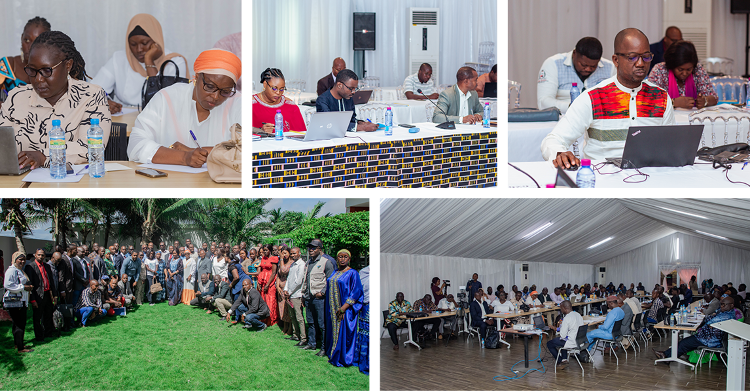AfCFTA: Regional workshops for key stakeholders

The International Islamic Trade Finance Corporation (ITFC), a member of the Islamic Development Bank (IsDB) Group, in collaboration with the United Nations Economic Commission for Africa, the Enhanced Integrated Framework (EIF) and governments of Benin, Burkina Faso, Guinea, Mauritania, Niger, Senegal, Togo, organized a series of workshops in the selected countries to promote and assess countries’ readiness for the implementation of various facets of the African Continental Free Trade Agreement (AfCFTA).
Officially launched in 2021, the AfCFTA has created the largest free trade area in the world by the number of countries participating and connects 1.3 billion people across 55 African countries.
Covering country-specific contexts in the operationalization of the AfCFTA, the workshops gathered major players and stakeholders in the public and private sectors across host countries.
These stakeholders offered comments, suggestions, and remarks to create informational guides and policy documents for the development of the countries’ National Strategy for the Implementation of the AfCFTA.
In line with their individual commitments to promote trade as a tool for development in Africa, ITFC, UNECA and the EIF through these workshops provided governments, national private sector and civil society organization (CSO) actors with the opportunity to brainstorm, co-design and collaborate on country and sector-specific roadmaps that take all concerns and resources into consideration.
The success of the AfCFTA depending greatly on a collaborative approach, the integration of private sector views in the national implementation strategies is a crucial element to reach the full economic development potential of the free trade agreement.
Republic of Benin
The Benin edition of the workshop series took place from the 9th to the 10th October 2023 in Cotonou, the capital.
The in-country workshop gathered experts, public and private institutions as well as civil society actors from 12 cities across the country.
Deliberations focused on trade support and access to funding in the implementation of the AfCFTA in Benin.
Republic of Burkina Faso
Designed to engage private sector actors in Burkina Faso, the Ouagadougou Workshop took place from the 11th to the 12th of May 2022. It afforded the government and its partners the opportunity to popularize the key orientations of the national strategy for the implementation of the AfCFTA among private-sector players, and to gather their opinions and outline their responsibilities and encourage their contribution to the financing of activities within the scope of the Strategy.
Republic of Guinea
Hosted in Mamou on the 9th and 10th September and the capital Conakry from the 13th to the 14th September 2023, the workshops gathered stakeholders from the small and medium enterprises (SMEs), transport, export, civil society, and investment promotion sectors to deliberate on experts’ finding and make inputs into the country’s national strategy document.
The deliberations revolved around the competitiveness of local economic actors and the impact of the AfCFTA on trade and investment.
Islamic Republic of Mauritania
The capital city of Nouakchott hosted a national workshop attended by government institutions as well as representatives of the private sector.
The workshop was part of the validation process of the national strategy document on the implementation of the AfCFTA.
Republic of Niger
The central role of private sector actors, women and young entrepreneurs, civil society, customs administration and Ministry of Trade experts, at both the central, local, and cross-border levels, have been recognized as crucial for enabling Niger to fully benefit from the enormous economic opportunities offered by the AfCFTA.
It is in this context that the capacities of more than 270 stakeholders from the target stakeholders of the cities of Niamey, Dosso, Maradi, and Agadez have been strengthened on the initiatives, tools, and major instruments for implementing the AfCFTA, including, among others, rules of origin, tariff concession lists, challenges, and opportunities of the agreement for Niger.
Republic of Senegal
Acknowledging the crucial role of the private sector in the successful implementation of the AfCFTA, the government of Senegal gathered key stakeholders for consultations on the guidelines for the application of the provisions of the AfCFTA to the private sector.
The deliberations afforded governmental stakeholders the opportunity to gather comments, suggestions, and remarks from key actors to draw up the final versions of the four Guides on the rule of origins, services trade, trade in goods and non-tariff barriers.
Republic of Togo
With one of the largest ports in the West-African sub-region, Togo has great interest in the happenings in the continental maritime sector. That set the stage for the National Consultation Workshop gathering relevant public and private actors in the maritime sector.
The stakeholders discussed the impact of the implementation of the AfCFTA on Togo’s maritime sector and the country’s readiness to take advantage of the opportunities the agreement presents.
Mr. Amadou Cire Sall, ITFC Regional Coordinator, Trade and Business Department, commenting on the significance of the workshops, stated: “The workshops offered a platform to stakeholders to deliberate on national dynamics within the scope of the AfCFTA.
“The workshops also provided ITFC and other strategic partners with a clear view on how best we can support governments in the implementation of the Agreement.
“We are convinced the outcomes of the deliberations will shape the next stage of the implementation of the AfCFTA in host countries and ITFC remains ready to support in working towards achieving this objective.”
On his part, Mr. Mamadou Sebego, Economist at the UNECA added: “It is important for trade organizations at the regional and international level to support local actors not only for them to understand the AfCFTA and its impact on the economy but also to partake in the localization of the Agreement.
“The success of the AfCFTA is intrinsically tied to its ownership by all economic and trade actors in the private sector, government and civil society. These workshops were designed to facilitate that, and they achieved those goals. We remain committed to supporting all actors in the trade sector alongside our partners, ITFC and EIF.”
African Press Organization

